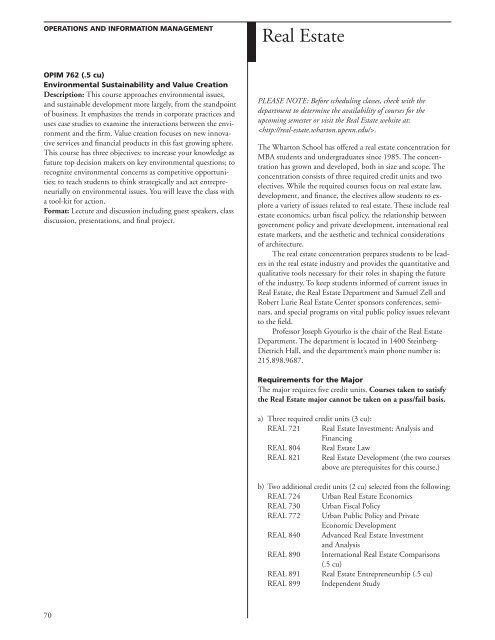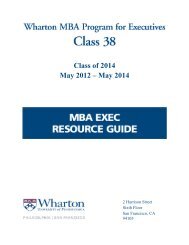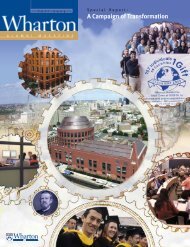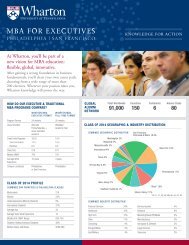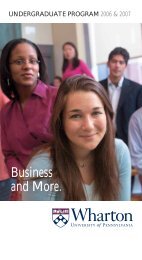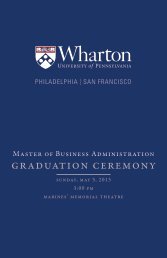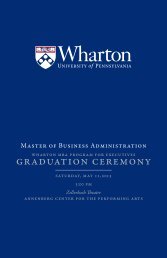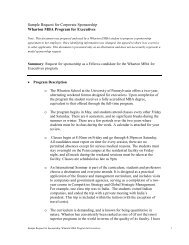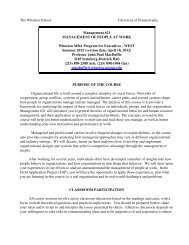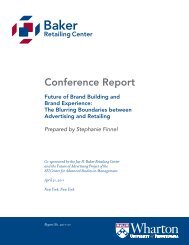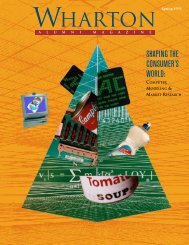Explore Options; Plan Your MBA Academic Program
Explore Options; Plan Your MBA Academic Program
Explore Options; Plan Your MBA Academic Program
You also want an ePaper? Increase the reach of your titles
YUMPU automatically turns print PDFs into web optimized ePapers that Google loves.
OPERATIONS AND INFORMATION MANAGEMENT<br />
OPIM 762 (.5 cu)<br />
Environmental Sustainability and Value Creation<br />
Description: This course approaches environmental issues,<br />
and sustainable development more largely, from the standpoint<br />
of business. It emphasizes the trends in corporate practices and<br />
uses case studies to examine the interactions between the environment<br />
and the firm. Value creation focuses on new innovative<br />
services and financial products in this fast growing sphere.<br />
This course has three objectives: to increase your knowledge as<br />
future top decision makers on key environmental questions; to<br />
recognize environmental concerns as competitive opportunities;<br />
to teach students to think strategically and act entrepreneurially<br />
on environmental issues. You will leave the class with<br />
a tool-kit for action.<br />
Format: Lecture and discussion including guest speakers, class<br />
discussion, presentations, and final project.<br />
70<br />
Real Estate<br />
Please note: Before scheduling classes, check with the<br />
department to determine the availability of courses for the<br />
upcoming semester or visit the Real estate website at:<br />
.<br />
The Wharton School has offered a real estate concentration for<br />
<strong>MBA</strong> students and undergraduates since 1985. The concentration<br />
has grown and developed, both in size and scope. The<br />
concentration consists of three required credit units and two<br />
electives. While the required courses focus on real estate law,<br />
development, and finance, the electives allow students to explore<br />
a variety of issues related to real estate. These include real<br />
estate economics, urban fiscal policy, the relationship between<br />
government policy and private development, international real<br />
estate markets, and the aesthetic and technical considerations<br />
of architecture.<br />
The real estate concentration prepares students to be leaders<br />
in the real estate industry and provides the quantitative and<br />
qualitative tools necessary for their roles in shaping the future<br />
of the industry. To keep students informed of current issues in<br />
Real Estate, the Real Estate Department and Samuel Zell and<br />
Robert Lurie Real Estate Center sponsors conferences, seminars,<br />
and special programs on vital public policy issues relevant<br />
to the field.<br />
Professor Joseph Gyourko is the chair of the Real Estate<br />
Department. The department is located in 1400 Steinberg-<br />
Dietrich Hall, and the department’s main phone number is:<br />
215.898.9687.<br />
Requirements for the Major<br />
The major requires five credit units. Courses taken to satisfy<br />
the Real Estate major cannot be taken on a pass/fail basis.<br />
a) Three required credit units (3 cu):<br />
REAL 721 Real Estate Investment: Analysis and<br />
Financing<br />
REAL 804 Real Estate Law<br />
REAL 821 Real Estate Development (the two courses<br />
above are prerequisites for this course.)<br />
b) Two additional credit units (2 cu) selected from the following:<br />
REAL 724 Urban Real Estate Economics<br />
REAL 730 Urban Fiscal Policy<br />
REAL 772 Urban Public Policy and Private<br />
Economic Development<br />
REAL 840 Advanced Real Estate Investment<br />
and Analysis<br />
REAL 890 International Real Estate Comparisons<br />
(.5 cu)<br />
REAL 891 Real Estate Entrepreneurship (.5 cu)<br />
REAL 899 Independent Study


